We just didn't bring enough fetish gear to get into the KitKat Club.
 |
| There are angels over the streets of Berlin. |
 |
| “If I can't smoke, it's not my revolution Too much anger, too little rage [my translation] [I |

 |
| The Reichstag fire of 1933. |
 |
| Berlin 2018 |
The streets of Berlin have always thrilled me. Full of light
and color, memories and ghosts,
they feel alive as any place I have ever been.
I had seen themBerlin on two previous occasions, in August of
1991 and 2009. Each time, the streets felt different. They felt wide open in 1991, rebuilt in 2009,
and under threat in 2018.
A week before I arrived, the people of Kreuzberg, the Turkish
corner of town, full of punks and Turks, held a demonstration called “Noise Against
Google.” Cities all over the world are facing the same challenge: can they beat
back the tides of identical details, of google, Starbucks, and monoculture and
thrive. Berlin faces the same challenge.
In the airport bar at JFK, a man by me and ordered a tequila and
then another. Wearing all black and
tattoos over his fingers, he asked if he had time for another drink and a food
order before making his flight. Sure
about the drink, maybe not enough time for the food order, I replied. Where are you going he asked me.
Berlin.
Really. I live there.
What are you doing there?
Trying to find Bowie’s Berlin.
Do you think I can find it? Does
it still exists?
Of course it does.
He wrote down the names of a few clubs and places to get high.
Go to Kater Blau and Sisyphus, like the myth.
But don’t look too normal. No jeans.
These are bondage clubs.
But if everyone tries not to look normal, then not looking normal looks normal.
Its the same thing.
But if everyone tries not to look normal, then not looking normal looks normal.
Its the same thing.
Go to café two place, across from mama’s bar. It’s a Turkish place.
They will sell you whatever you need there.
And then go down to the river.
Its where everyone is hanging out in the summer.
Its where everyone is hanging out in the summer.
You can drink there.
Its legal.
A few days later, I arrived at my hotel, Die Fabrik, Baxpax
Hotel, at Schlesische Straße 18, in Kreuzberg, greeted by graffiti,
people sitting in cafes, drinking cheap beer from the nearby bodegas.
I love the trains and train stations in Berlin. But this time the Berlin Hbf feels like a
shopping mall, just like all city train stations.
Be warned, Marc noted on the phone earlier, its not easy to
navigate, especially if you are short. Those signs are pretty high.
He was right. I couldn’t
read a thing.
So I circled the station as I always do in new cities, trying to
get my bearings, figuring out how to find my way through the labyrinth.
Walking from the subway, new buildings are going up everywhere,
bulldozers razing street murals, just like Hong Kong.
My friend Marc was there to greet me. We’d last seen each other at the COP21 in
Paris in 2015 and his father’s funeral the subsequent year.
Marc is the editor of one of my favorite journals ever, the
Journal of Aesthetics and Protest, as well as a student of the messy nuances of
social movements and the art people use to communicate about them. We laughed for hours in Paris. And did the same in Berlin. My friend Allesandra, who JC introduced me to
at 169 Bar in Chinatown years ago, dropped us a message saying she was
around. We should all get a beer. The evening was planned.
The amiable desk clerk at Die Fabrik reminded me of a gentleman in
the same role who used to greet my dad at the Chelsea Hotel, back in the day. In
between old maps of Berlin, a sign in the lobby declared:
“Blessed are the weird people,
The poets and misfits
The artists
The writers
The dreamers
The outsiders
For they force us to see the world
Differently.”
The beat spirit is everywhere in Kreuzberg.
But it’s position is a precarious one.
Marc took me out into the Berlin sunshine to have a beer on the
corner, telling me about his writing and drawings, his research on the ghost
dance and the way he was trying to write about it.
I thought of a poem Art gave me years ago in
San Francisco. Doomed to die in a
hospice, he moved out weeks later . . . . "All those 'what if's' were
sucking the life out of me." A Catholic
priest, called himself a "healing worker", he moved to San Francisco
from New York in 1982 and died in 1994 after that first short interview. The next summer I showed his poem to Cleve
Jones during a long interview.
SIOUX DREAMED
THE GHOST DANCE
OUT OF HOPE AND GRIEF
BELIEVING THEY COULD
DANCE BACK
THEIR DEAD
THE WARRIOR
THE BUFFALO
THE COMMUNION
OF LIVING AND DEAD
WAS FOR SOME
TOO FRIGHTENING
(I.E. POWERFUL)
THE FIRST GROUP
WAS DISPERSED
(I.E. MASSACRED)
BUT THE DANCE CONTINUES.
PERHAPS WE NEED A NEW GHOST DANCE
A DANCE FOR THE JEWS
A DANCE FOR THE WITCHES
A DANCE FOR THE GAY MEN
A DANCE FOR COMMUNION AND HOPE
I WOULD HAVE IT BE FRIGHTENING.
"Yea, I would have it be frightening
too. I talk about it (the Ghost Dance) a
lot. I hope that it's not a complete
rehearsal. I don't think that it
is," Cleve Jones replied when I showed him the poem in 1995.
Civilizations crumble and new ones are born, but the memories of
old struggles linger. That’s what I
sense walking the streets of Berlin, feeling those old ghosts, of Checkpoint
Charlie, walls rising and crumbling, the massacres and towering infernos which
once consumed this place.
There are angels in the streets of Berlin, Wim Wenders and Peter Handke. reminded us all those
years ago in Wings of Desire, my
favorite movie about Berlin.
·
When the child was a
child
it walked with its arms swinging,
wanted the brook to be a river,
the river to be a torrent,
and this puddle to be the sea.
When the child was a child,
it didn’t know that it was a child,
to it, everything had a soul,
and all souls were one.
it walked with its arms swinging,
wanted the brook to be a river,
the river to be a torrent,
and this puddle to be the sea.
When the child was a child,
it didn’t know that it was a child,
to it, everything had a soul,
and all souls were one.
When
the child was a child,
it had no opinion about anything,
had no habits,
it often sat cross-legged,
took off running,
had a cowlick in its hair,
and made no faces when photographed.
it had no opinion about anything,
had no habits,
it often sat cross-legged,
took off running,
had a cowlick in its hair,
and made no faces when photographed.
When the child was a child,
It was the time for these questions:
Why am I me, and why not you?
Why am I here, and why not there?
When did time begin, and where does space end?
Is life under the sun not just a dream?
Is what I see and hear and smell
not just the reflection of a world before the world?
Is there really such a thing as evil, and people
who really are the Bad Guys?
It was the time for these questions:
Why am I me, and why not you?
Why am I here, and why not there?
When did time begin, and where does space end?
Is life under the sun not just a dream?
Is what I see and hear and smell
not just the reflection of a world before the world?
Is there really such a thing as evil, and people
who really are the Bad Guys?
How can it be that the
I, who I am,
didn’t exist before I came to be,
and that, someday, the I who I am,
will no longer be who I am?
didn’t exist before I came to be,
and that, someday, the I who I am,
will no longer be who I am?
·
Lied
Vom Kindsein (Song of Childhood) – Peter Handke.
Of course, Columbo, or Peter Falk has the best lines.
To smoke, and have
coffee - and if you do it together, it's fantastic.
What
a dear face! Interesting. What a nostril. A dramatic nostril. These people are
extras. Extra people. Extras are so patient. They just sit. Extras. These
humans are extras. Extra humans.
I always feel them walking these streets.
Marc and I stroll, stepping into a few bookstores, taking snap
shots and horsing around,
“Kill all straight men, starting with yourself,” declares one.
Look, someone leaves mattresses out with messages for the streets.
Look, someone leaves mattresses out with messages for the streets.
“Too expensive,” bemoans a woman in a mural, as we are passing
through the majestic Garlitzer Park. A whiff
of pot passed across my face.
“Pot, hash,” a man whispered, murals everywhere, kinderbauerhof,
a kids play space / park to the right.
People sit taking in the sunshine.
“Robby could not believe that public space could be like this,”
notes Marc, referring to his twin brother.
“the only good idea is procrastination,” notes another marker.
We meet Alessandra at Prinzessinnen Garten at 7 PM.
She shows us the garden plots and bike
repair station inside the garden and we drank a beer.
The neighborhood is changing, she explains.
Just like Brooklyn.
Cities around the world are going through the same challenge, asking the same questions about sustainability.
Green spaces like this could be the future of cities.
Just like Brooklyn.
Cities around the world are going through the same challenge, asking the same questions about sustainability.
Green spaces like this could be the future of cities.
This garden is great. Its part of the solution, a green
space that brings people inside, creating hubs of energy, paradoxically
creating conditions that help increase property values, displacing those who have supported the place. It’s a pattern that
takes place around the world, from Berlin to East Village Brooklyn.
The garden has just gotten a 99-year lease.
A group of activists is sitting discussing what the garden can
be and how it can best sustain itself and the neighborhood over the next
hundred years.
Its time for me to leave notes
She is moving to a neighborhood across the city.
Walking, we sit at another bar at a social center.
Alessandra and Marc talk about the organizers who bickered over
what the garden was going to be. It always comes down to money and power.
“All these alternative scenes fight each,” laments Alessandra. “…even here in one of the most vital scenes
in Europe, people become dogmatic.” She
gives an example of the annual gay pride parade. For many years, Krezberg had a gay pride
parade that everyone joined. We felt
like we were all supporting difference.
Then one group after another split off and started their own parades. They had a fight over a fight over police and
the flag. And more marches got planned.
It was supposed to be about supporting
difference. But everything had a new march. We could each have one. But it
wasn’t supporting each other anymore, we were celebrating
identity. It took the joy our of it.
We are undermining each other, spending more time fighting each
other.
There was a demo every week.
Some days I just wanted to get home.
Is it self service or a relationship? Is there room for compromise or an identity?
Is there still room for a big broad left imagination?
Should we go to KitKat Club?
Not on Monday, notes Alessandra.
Should we go to KitKat Club?
Not on Monday, notes Alessandra.
Walking to the river, Alessandra, regales us with stories of her
adventures at the Kit Kat Club, ,
public sex and fetish gear.
public sex and fetish gear.
Kids are hanging out in the summer night. And we talk late into
the night.
The next day, my friend Steve visits.
“Its just like the east village here,” he smiles, glancing at
the punks and graffiti.
We wander over to the
Reischtag. The big gate reminds me of
the angels and demons, the fire of 27 February 1933 that Hitler used to justify his power grab, invading armies battling over the fate over
the fate of the city, the building crumbling and rising and bombed and rising again.
We walk, looking at government buildings.
The first time I was here the spaces around here felt aered in
in flux. Men were selling old soviet
garb. The next time, we stopped at a
giant student bookstore, just next door.
And this time, it feels full of tourists and a building boom.
Its amazing that this place is holding Europe together, observes
Steve.
The Germans are a mature people, he theorizes. They have seen
what happens when government makes bad decisions or falls pray to the lesser
angels of their nature. So now they take decision making seriously. American
lacks that maturity, he concludes. Its
just about ourselves, just about greed.
Its not quite the Kit Kat Club, but the
Clarchens Ballhouse, where we wandered after dinner, is just
right.
People are sitting outside eating traditional German food;
inside the old ballhouse they are dancing.
Its great to see people here.
Steve and I make our way back to Kreuzberg.
After the five k walk here, the subway home is a relief.
We sit in Krezberg drinking the final beer of the day, reflecing
on our changed lives. Berlin is a place
to stay out, he smiles looking at the red lights in the bar, the Clash playing.
I remember riding back from Barbes with you in the snow. New
York was great, he laments.
Europe is not always easy.
Neither is the US, which seems unable to grasp the common sense
supports, Europe provides of citizens, free schools, healthcare, vacations, and general livability. Its just not a question notes Steve. The life is better here, even if you can’t
always fit in.
We have coffee the next day in the sun and I make my way back to catch my flight. I walk past the graffiti and street
art for the train to the bus to the plane to the tram to the subway, to make
my way all that way back home.
Visiting Berlin is like visiting an old friend. Are you doing well, you ask when you visit?
The Nazis and Communists are outg But google is not bar behind, a different threat erasing
difference, homogenizing the neighborhoods. Can I say I found Bowie’s Berlin –
probably not. But the beer on the river still felt special, the graffiti still
felt compelling, the stories of this space still thrilling. Keep Austin Weird, the t shirts
declare. Keep Google out of Berlin.
Day two in Berlin.



















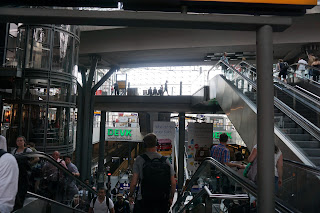












































































































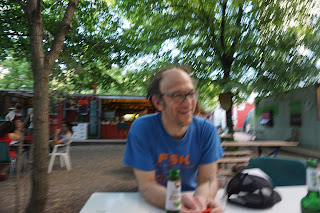






















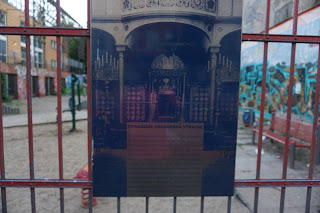


















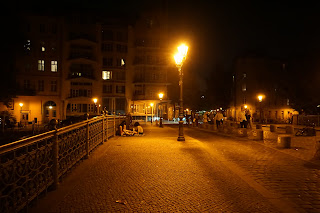




























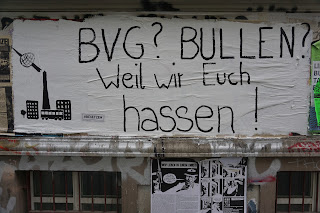
















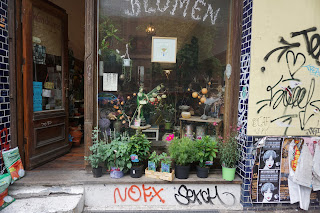



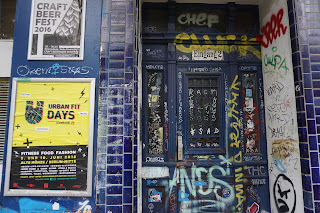






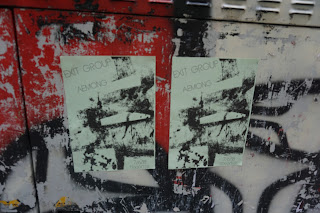





















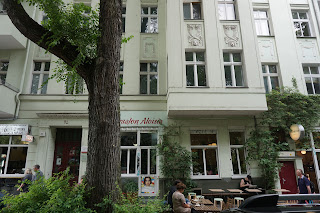

















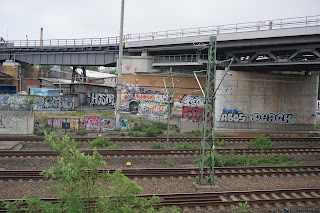




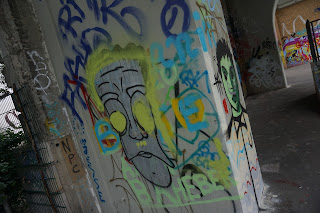





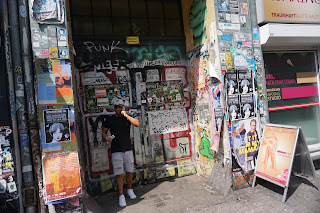
























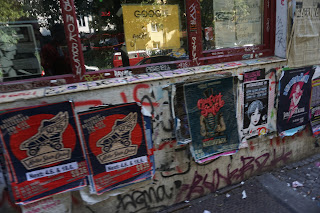















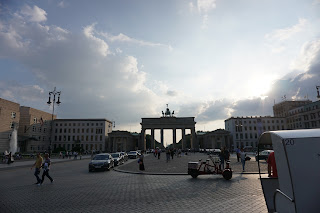









































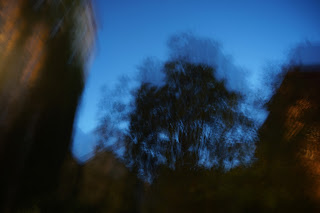










This comment has been removed by a blog administrator.
ReplyDelete